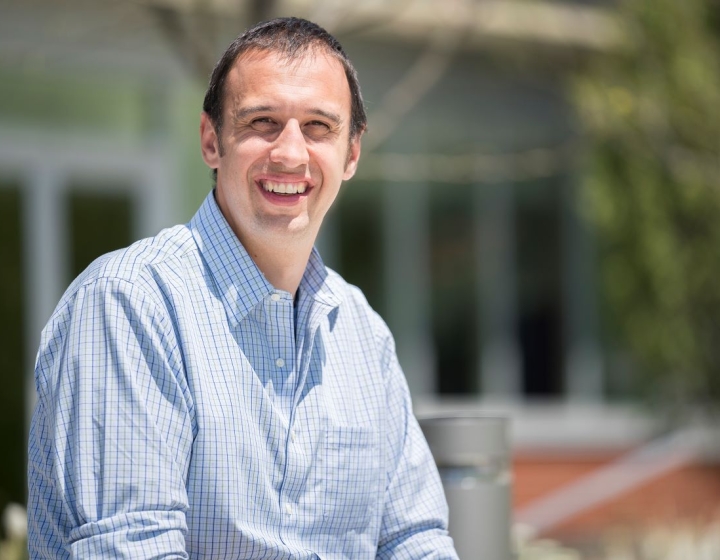Science sharing extravaganza marks Cornell's 12th Annual Biological and Biomedical Sciences Symposium
Science lovers old and young convened at Cornell’s 12th Annual Biological and Biomedical Sciences Symposium to share and celebrate science in a daylong event.
More than 100 people attended to see the day’s faculty seminars, graduate student research talks, preeminent guest lecture, and student poster session contest. Attendees had opportunities to learn from and network with students, faculty, and visiting scientists spanning a spectrum of biomedical sciences.
“The symposium is a great way for researchers to meet each other and learn what others are doing in the field,” said Dr. Joel Baines, associate dean for research and graduate education. “It’s a testament to the breadth and depth of our work and the vibrancy of our community. Importantly, the symposium clearly illustrates the concept of one medicine and the value of comparative scientific studies. The impact of the work presented is very broad, and comprises cutting-edge advances in the biological sciences that apply to medicine in both humans and animals.”
Faculty talks
 The day kicked off with several seminars from Cornell’s Department of Clinical Sciences faculty. Afterward, more than 90 people gathered, filling every chair and lining the walls with interested listeners, to hear this year’s Douglas D. McGregor Research Lecture. This annual talk is named after Dr. Douglas McGregor, professor emeritus and former director of Cornell’s Baker Institute for Animal Health and Associate Dean for Research and Graduate Education. Visiting medical maven Steve Badylak, D.V.M., Ph.D., M.D. delivered this year’s keynote address to a full house.
The day kicked off with several seminars from Cornell’s Department of Clinical Sciences faculty. Afterward, more than 90 people gathered, filling every chair and lining the walls with interested listeners, to hear this year’s Douglas D. McGregor Research Lecture. This annual talk is named after Dr. Douglas McGregor, professor emeritus and former director of Cornell’s Baker Institute for Animal Health and Associate Dean for Research and Graduate Education. Visiting medical maven Steve Badylak, D.V.M., Ph.D., M.D. delivered this year’s keynote address to a full house.
As the University of Pittsburgh’s McGowan Institute for Regenerative Medicine Deputy Director, Badylak travelled to Cornell to share the science behind his groundbreaking advances in regenerative medicine techniques that have healed people formerly deemed incurable. His talk, “How regenerative is regenerative? A biologic scaffold approach,” included case discussions in which Badylak’s team restored leg function to injured veterans and replaced cancerous tissue with healthy new tissue in patients with late-stage esophageal cancer.
 Student talks
Student talks
Student presentations filled the rest of the morning, including “Response of microRNAs to DNA replication stress is important for genome maintenance in mammalian cells,” by Gongshi Bai, “Molecular analysis of the mammalian DNA damage checkpoint protein Hus1” by Pei Xin Lim, “Hybrid nanomaterials differentially control selectin-mediated adhesion and isolation of circulating tumor cells and leukocytes under flow” by Michael Mitchell,” and “Tuning three-dimensional collagen matrix stiffness independently of collagen concentration modulates endothelial cell sprouting and vessel integrity” by Brooke Mason.
Afternoon student talks included “Bone morphogenetic protein‐4 (BMP4) promotes activation of bovine primordial follicles in vitro” by Lara Mouttham, “Cox2 signaling during the peri-implantation period plays an important role in fetoplacental heath in a mouse model of preeclampsia, BPH/5” by Jenny Sones, “The Hrd1-Sel1L axis of endoplasmic reticulum-associated degradation prevents exocrine pancreatic insufficiency and premature lethality” by Iris Sun, and “Left-right signaling axis in the dorsal mesentery drives organ-specific vascularization of the midgut” by Aparna Mahadevan.
 Poster session and awards
Poster session and awards
At the Poster Session that followed, dozens of students stood by posters explaining their work in the CVM atrium, sharing their research with each other and with many faculty, staff, and visitors attending. The program closed with a talk on “Scientific Street Smarts” with Dr. Cynthia Leifer, associate professor in the Department of Microbiology and Immunology. The day’s collegial closing ceremony included food and beverages for all, and awards for the most outstanding student presentations.
The following awards went to students with the best oral abstracts:
1st place – Michael Mitchell, prize: $500 Conference Travel Grant award from the Office of Graduate Education (OGE)
2nd Place – Pei Xin Lim, prize: $300 Conf. Travel Grant award from OGE
3rd Place – Jenny Sones, prize: $200 Conf. Travel Grant award from OGE
 The winners of the poster session were:
The winners of the poster session were:
1st place – Frances Chen, prize: $250 Conf. travel grant award from OGE
2nd place – Ezen Choo, prize: $150 conf. travel grant award from OGE
3rd place – David Gludish, prize: $100 conf. travel grant award from OGE





